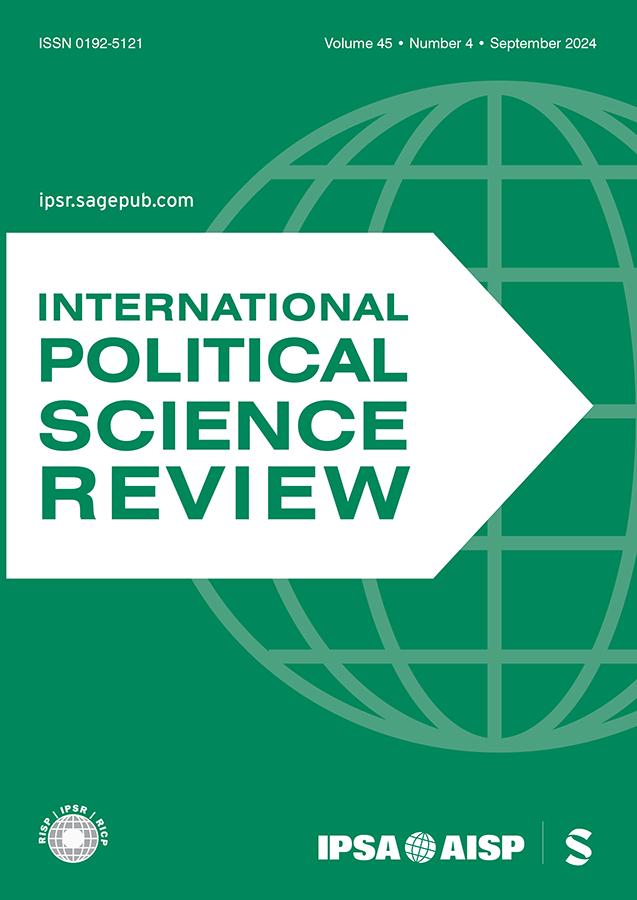

The latest issue of the International Political Science Review (IPSR) (Volume 45, Number 4, September 2024) addresses the role of international organizations, international financial institutions, as well as a range of different factors in- and outside of political systems that have an impact on political representation. In the opening piece, Andreas Kokkvoll Tveid and Vegard Tørstad compare the effectiveness of air pollution regulations by the United Nations and the European Union. They find that the EU’s enforcement mechanisms make it a much more effective regulator but can benefit UN regulations as well when they overlap with those of the EU.
The second piece by Yoshimoto examines aid projects by the World Bank and China, respectively, and their effect on state legitimacy in Tanzania. The author argues that the Chinese aid was more effectively able to project state legitimacy than the World Bank’s aid, which follows a “contractarian” approach.
Henk Erik Meier et al. examine the public legitimacy of elite athletes’ activism in the case of Germany. The authors conclude that western publics are willing to accept athletes’ political activism as long as their political stances overlap with their own but tend to reject contrarian activism.
Robertson’s piece examines the role of personality traits have in the way individuals’ experiences of corruption affect their ability to trust in government and police, as well as the way they process the corruption experience itself. Robertson finds that openness, conscientiousness, agreeableness and emotional stability increase the negative effect of corruption experiences on trust in police, but only extraversion has an amplifying negative effect on trust in government.
Refki and Faerman examine the effect of gender on female politicians’ persistence in running for office. They conclude that an internalization of the role of political actors helped female politicians persist in their quest for political office. Using the African continent as a case study, Lemaire researches the effect of censorship on young people’s use of social media to obtain political information. Overt forms of government information control appear to affect a higher use of social media as an informational tool.
Focusing on sub-Saharan Africa specifically, Cassani and Tomini investigate the resiliency of term limits. They find democracy to be the most salient factor in the resiliency of term limits. However, other, non-democracy-specific factors, such as path dependence, regime legacies, and opposition also appear to play a role.
In the penultimate article, Kaplan et al. examine the importance of a national metanarrative for people’s collective sense of representation. Using Israel as a case study, the authors argue that internalization of the collective metanarrative leads individuals to feel better represented.
Finally, in the last piece of this issue, Claveria and Lavezzolo examine gender stereotyping in leadership roles. Using Spain as a case study, the authors examine the role of gender specifically in the case of the Finance Minister cabinet position. They find that while women tend to be preferred for this position, being single benefits female finance ministers more than it benefits male ones.
International Political Science Review
Established in 1980, the International Political Science Review is committed to publishing peer-reviewed articles that significantly contribute to political science. IPSR is published five times per year. IPSA members can access all issues of the journal, including the IPSR archive dating back to 1980, through the My IPSA menu.
Original Research Articles
The relative effectiveness of overlapping international institutions: European Union versus United Nations regulations of air pollution
Andreas Kokkvoll Tveit and Vegard Tørstad
Do aid projects from World Bank and China impact state legitimacy differently? An exploratory analysis in Tanzania
Iku Yoshimoto
The public legitimacy of elite athletes’ political activism: German survey evidence
Henk Erik Meier, Markus Gerke, Swantje Müller and Michael Mutz
Who reduces political trust after experiencing corruption? Introducing the role of personality traits
Felicia Robertson
The making of female politicians: Why political identity matters
Dina Refki and Sue Faerman
Online censorship and young people’s use of social media to get news
Pauline Lemaire
Time to go: Paths of term limit resilience in sub-Saharan Africa
Andrea Cassani and Luca Tomini
People’s sense of political representation and national stories: The case of Israel
Yael R Kaplan, Tamir Sheafer, Israel Waismel-Manor and Shaul R Shenhav
Don’t put a ring on it: Gender stereotypes in citizens’ preferences for executive positions
Sílvia Claveria and Sebastián Lavezzolo











